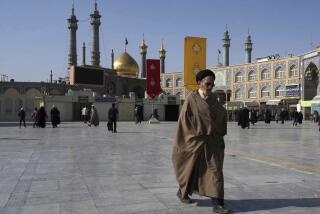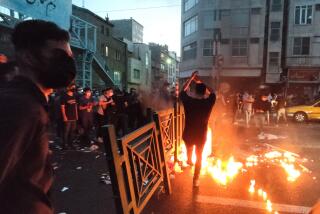Shiite Leader Returns From Exile
- Share via
BASRA, Iraq — Ending 23 years of exile in Iran, a senior Shiite leader returned to his homeland Saturday, calling for a moderate Islamic government to replace the ousted Saddam Hussein.
“We don’t want an extremist brand of Islam,” Ayatollah Mohammed Bakr Hakim told thousands of supporters in an open-air stadium in Basra. “We want an Islam that is compatible with independence, justice and freedom.”
“Yes, yes to Hakim!” shouted the audience, many of whose members had been bused to the event hear the leader of the largest Shiite opposition group. “Yes, yes to Islam!” they chorused.
Even though he deliberately struck a moderate tone in laying out his vision for Iraq’s future, Hakim represents a potential dilemma for the United States as it tries to rebuild Iraq after the war.
Because the opposition group Hakim leads, the Supreme Council for Islamic Revolution in Iraq, has been hosted and funded by Iran’s hard-line Shiite religious leaders for more than two decades, he has been suspected of seeking to create an Islamic government in Iraq like the one next door.
The United States has warned Iran not to interfere, a pointed reference to Iran-backed guerrillas who have moved into Iraq.
Hakim’s group also has an armed wing, the Badr Brigade. Authorities estimate that thousands of brigade members have returned to Iraq.
There also have been fatwas, or religious edicts, calling on the Shiite majority, which was oppressed under Hussein, to take action to ensure a place in the new government.
Hakim, 63, was jailed and tortured for opposing Hussein in the 1970s, and 19 of his relatives were killed by the regime. He fled to Iran, where he became head of the council in 1980.
Aides and relatives said Hakim soon will step down from the leadership of his group so he can establish himself in Najaf as a religious authority above the political fray.
His brother, Abdelaziz Hakim, who already represents the group in talks with other Iraqi leaders and the United States, will take his place.
Ayatollah Mohammed Bakr Hakim’s arrival is widely expected to intensify the rivalry over who will represent Iraqi Shiites, who make up about 60% of the country’s population.
Once in Najaf, Hakim, whose religious credentials are modest, will face considerable challenges in his quest to acquire greater spiritual authority. The majority of Muslims around the world are members of the Sunni sect, but Shiites are in the majority in Persian Iran and Arab Iraq.
But Hakim’s years of exile have made him a stranger to a new generation of young Iraqis.
Many residents of Basra, a Shiite city that rebelled against Hussein in 1991 only to have the uprising brutally put down by Baghdad, said they have few memories of Hakim from his time in Iraq and support a more senior spiritual leader in the holy city of Najaf, Grand Ayatollah Ali Sistani, who had remained in the country.
Since the U.S.-led coalition took over Iraq, some services have been supplied by local leaders, and in Shiite areas that has often meant religious figures.
Riadh Fadhel, a 33-year-old engineer, said Shiite leaders should stop competing for influence and devote themselves to building a better Iraq.
“We want a Shiite leader in Iraq who ensures that Shiites get their fair share,” Fadhel said. “If everyone agrees that Islam should be the path, why should there be differences?”
The ayatollah, during a speech Saturday afternoon in an auditorium in Basra, tried to reacquaint himself to the new generation by pointedly saying that young people and women should play a principal role in the rebuilding of Iraq.
“Some people imagine that clerics just sit in the mosque, unaware of what’s going on around the world,” Hakim said, sitting on a stage surrounded by six bodyguards.
“But we want to build the government, a modern one that understands reform.”
The new government, he said, “will be modern ... to go along with the modern world, today’s world ... and it will be able to bring Iraq to its natural place in the Arab and Islamic world.”
He added, “We are proud of our Shiaism, but we will not impose it on anyone.”
Although the heartland of Hakim’s support is Najaf, where he was born and his father reigned as Iraq’s religious authority for more than three decades, he is traveling there slowly, planning to stop along the way in the smaller Shiite cities of Nasiriyah and Amara.
The ayatollah’s aides are nervous about his security and postponed the trip several times until British forces in southern Iraq deemed it sufficiently safe.
He began his return Friday in Tehran.
“The future of Iraq belongs to Islam,” he said during a teary address at Tehran’s Friday prayers. “Independence must be the central objective and the other priority will be fostering the will of the people and the establishment of justice.”
A representative of Iran’s supreme leader, Ayatollah Ali Khamenei, escorted Hakim to Tehran’s airport, where they embraced emotionally before Hakim boarded a plane for Iran’s southwestern province, Ahwaz.
From there, he traveled by convoy -- about half a dozen white Toyota Land Cruisers -- to the border two hours away. He was greeted by more than 5,000 supporters, mainly teenage boys and men in their early 20s.
A riotous crowd of several thousand gathered on the banks of the Shatt al Arab, the waterway along the southern border between Iran from Iraq, to greet the ayatollah’s heavily guarded caravan -- which included his nephews and several influential Iraqi religious leaders in exile -- as it crossed into Iraqi territory.
“We waited for this day for a long time,” said Mohammed Tamoul, 34, an Iraqi who spent 10 years in Iran as a prisoner of war. “Hakim has lost many family members in his struggle for freedom from Iraq.”
Two sheep were sacrificed on the bridge in honor of the occasion, and backers waved flags bearing photos of Hakim’s brothers who were killed by Saddam Hussein’s regime.
Then they drove to Basra, about 40 minutes away, where the curious lined the streets as he passed.
More to Read
Sign up for Essential California
The most important California stories and recommendations in your inbox every morning.
You may occasionally receive promotional content from the Los Angeles Times.













